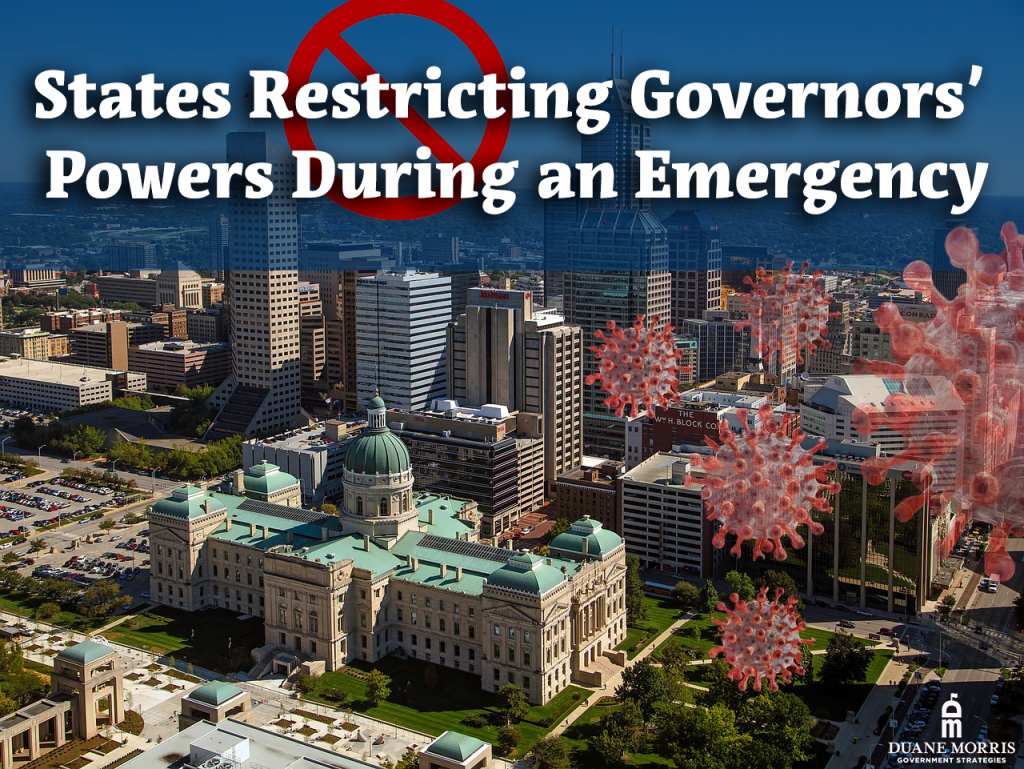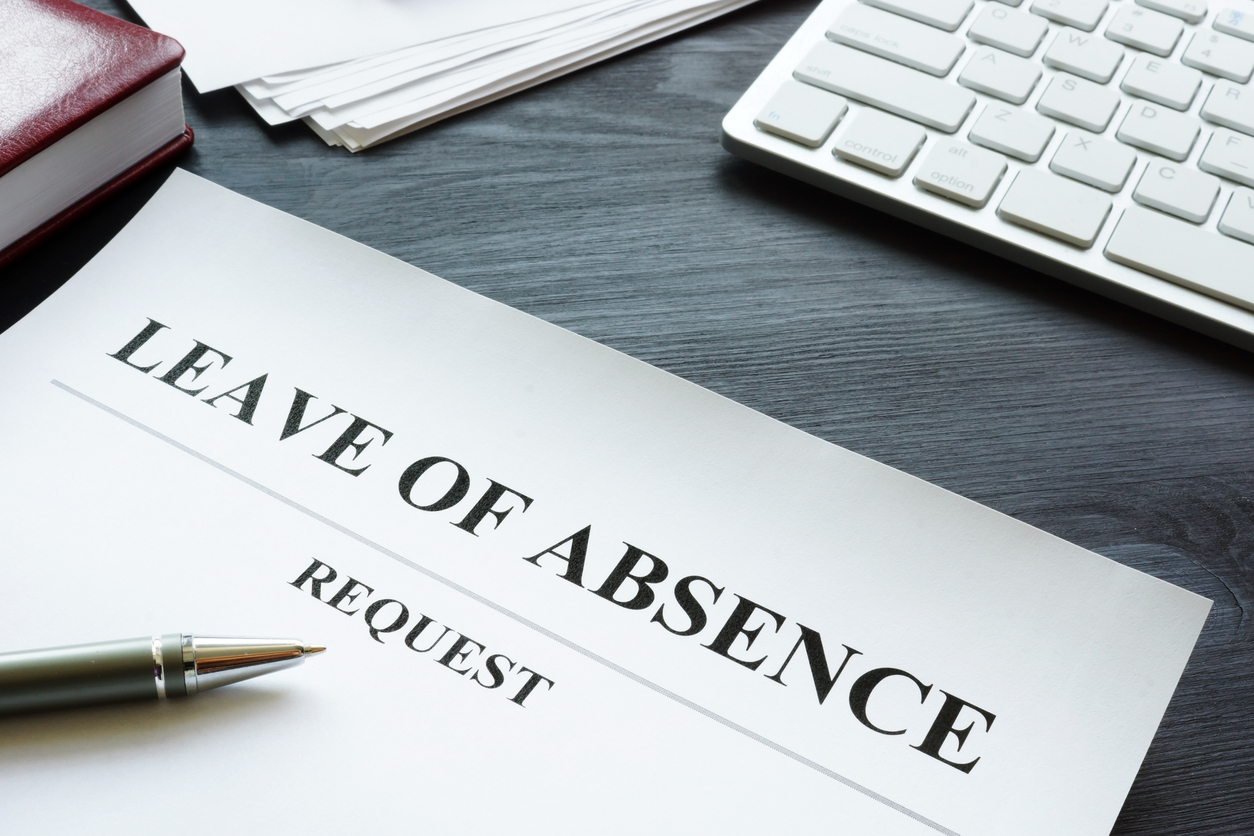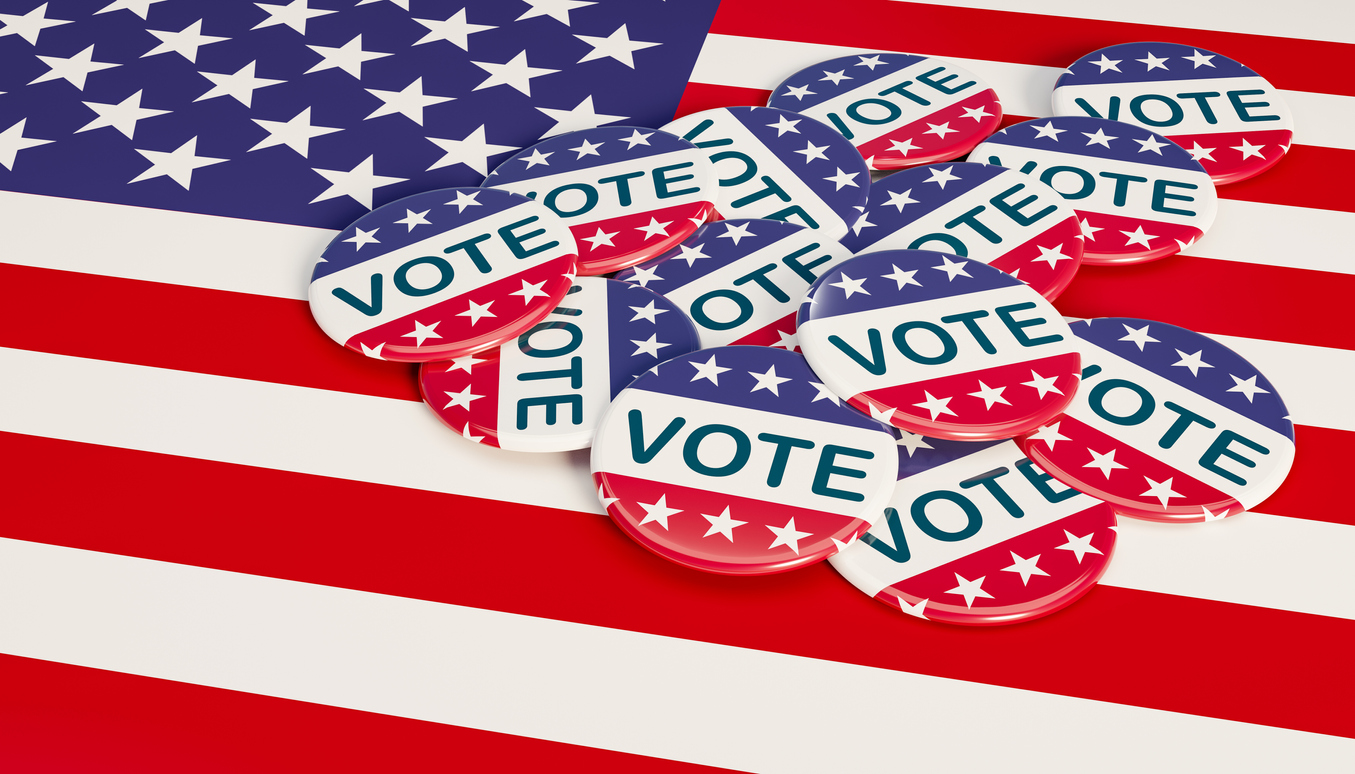
The COVID-19 pandemic brought about unprecedented actions by state governments across the country. Governors across the U.S. issued a myriad of executive orders and declarations in response to the pandemic, including new restrictions related to COVID-19. Such actions have brought criticism from some state lawmakers, who have wanted a more significant say in their state’s response to COVID-19. As a result, lawmakers in numerous states have introduced, and some have passed, legislation restricting governors’ powers during an emergency.
In 2021, lawmakers in 45 states have introduced more than 300 measures related to increasing legislative oversight of executive actions during the pandemic.
Indiana: Legislation Restricting Governors’ Powers and Adding Legislative Oversight
Indiana lawmakers passed House Bill 1123 in early April, addressing states of emergency within the state. Under the legislation, the General Assembly may convene if the legislative council adopts a resolution finding all the following:
- The governor has declared a state of emergency that the legislative council determines has a statewide impact;
- The general assembly must address the state of emergency with legislative action; and
- According to its authority, the general assembly must convene an emergency session to determine the length and frequency of legislative sessions under Article 4, Section 9 of the Indiana State Constitution.
The resolution adopted by the legislative council must state the reasons that lawmakers must convene to address a state of emergency, the date, time, and place that each house of the General Assembly will convene, and the General Assembly’s agenda for addressing the state of emergency. Further, an emergency session may not last more than 40 calendar days. Lawmakers may only act on bills relating to the agenda laid out in the legislative council’s agenda.
House Bill 1123 further establishes the legislative state of emergency advisory group. The group would make itself available to consult with, receive information from, and advise the governor concerning the state of emergency and any executive orders issued by the governor in response to a state of emergency.
The bill also establishes a Federal Economic Stimulus Fund (ESF) to deposit all “discretionary funds” received by the state. “Discretionary funds” are defined as federal economic stimulus funds received under federal legislation granting the state authority to determine the amounts and way the federal economic stimulus funds may be expended. Discretionary funds deposited into the ESF when lawmakers convene in a session may not be allotted or expended unless appropriate by the General Assembly or reviewed by the Budget Committee. If lawmakers are not in session, the Budget Committee must review discretionary funds deposited into the ESF before being allotted or expended.
Governor Eric Holcomb vetoed the legislation on April 9, but lawmakers in both the House and Senate overrode the governor’s veto.
Kentucky: Legislation Restricting Governors’ Powers During an Emergency
Kentucky lawmakers passed four bills in January circumscribing the Kentucky governor’s power during a state of emergency.
House Bill 1 states that any business, for-profit or non-profit organization, local government, association, or any school or school district, public, private, or religiously affiliated, may remain open and fully operational for in-person services as long as it adopts an operating plan which meets or exceeds CDC guidelines or by the executive branch (whichever is least restrictive), details how they will foster the safety of employees, customers, attendees and patrons, and is posted in a conspicuous place on the main entrance door of their physical location.
House Bill 5 limits the governor’s authority to temporarily reorganize administrative agencies and transfer personnel without the legislature’s approval.
Senate Bill 1 states that executive orders, administrative regulations, or other directives issued by the governor cannot go longer than 30 days unless lawmakers approve an extension, modification, or termination. Such approval would be before the extension of an executive order or directive that places restrictions on the in-person meeting or places restrictions on the functioning of (1) elementary, secondary, or postsecondary educational institutions, (2) private businesses or non-profit organizations, (3) political, religious, or social gatherings, (4) places of worship, or (4) local governments, and imposes mandatory quarantine or isolation requirements. Senate Bill 1 also allows lawmakers to terminate emergency declarations at any time.
Senate Bill 2 would essentially make it more difficult for the governor to direct state agencies to issue emergency regulations without justifying the situation’s emergency cause.
Governor Andy Beshear vetoed all four bills, but the Legislature overrode all four vetoes.
New York: Rescinding Power Given Last Year to Governor Cuomo
Lawmakers in New York passed Senate Bill S7919 last year, allowing the governor to issue any directive necessary to respond to a state disaster emergency. However, lawmakers passed Senate Bill S5357 in March of 2021. S5357 provides that lawmakers may terminate, via concurrent resolution, a state disaster emergency. The legislation states that lawmakers declare that the governor is adequately equipped with his previous existing emergency powers and with the authorization to continue existing directive extension and medication powers to deal with the current pandemic situation. Lawmakers, through S5357, hope to bring back the “pre-pandemic balance of power” between the governor and the legislature.
The new legislation requires the governor to have a legislative review to introduce new executive orders related to the state’s response to the pandemic. Governor Andrew Cuomo signed the bill on March 7, 2021.
Pennsylvania: Legislation Restricting Governors’ Powers Passed, Now On the Ballot
Lawmakers in the Keystone State sought to amend the state constitution to limit the governor’s powers during an emergency. However, Pennsylvania lawmakers must pass constitutional amendments during two separate legislative sessions before the amendment is placed on the next election ballot. Accordingly, lawmakers passed SB 1166 in the 2020 session and SB 2 in the 2021 session, setting up a ballot referendum in the May 2021 primary elections.
The bills passed by lawmakers stipulate a disaster emergency declaration shall only be in effect for no longer than 21 days unless extended by concurrent resolution from the General Assembly. The bills also state that upon the expiration of a disaster emergency declaration, the governor may not issue a new declaration based on the same or substantially similar facts and circumstances without the passage of a concurrent resolution of the General Assembly which expressly approves such a new declaration.
The bills also provide a separate amendment to provide racial equality under the Pennsylvania Constitution by prohibiting the denial or abridgment of equality of rights due to race or ethnicity.
The Pennsylvania Department of State crafted the following questions, which will appear on ballots in the upcoming primary elections:
- Shall the Pennsylvania Constitution be amended to change existing law and increase the power of the General Assembly to unilaterally terminate or extend a disaster emergency declaration—and the powers of Commonwealth agencies to address the disaster regardless of its severity pursuant to that declaration—through passing a concurrent resolution by simple majority, thereby removing the existing check and balance of presenting a resolution to the Governor for approval or disapproval?
- Shall the Pennsylvania Constitution be amended to change existing law so that: a disaster emergency declaration will expire automatically after 21 days, regardless of the severity of the emergency, unless the General Assembly takes action to extend the disaster emergency; the Governor may not declare a new disaster emergency to respond to the dangers facing the Commonwealth unless the General Assembly passes a concurrent resolution; the General Assembly enacts new laws for disaster management?
- Shall the Pennsylvania Constitution be amended by adding a new section providing that equality of rights under the law shall not be denied or abridged because of an individual’s race or ethnicity?
Texas: Legislation Requiring Governors to Call a Special Session to Continue Emergency Declarations
Texas found itself in a unique position last year when the pandemic hit. Lawmakers meet every other year and were not in session in 2020, leaving Governor Greg Abbott to address the pandemic via numerous executive orders and declarations. With lawmakers in session this year, the Texas Senate recently passed a bill that would limit the governor’s power during emergencies via a constitutional amendment.
SJR 45 would require the governor to call a special legislative session if they wish to continue a declaration more than 30 days when any of the following conditions are met:
- The declaration affects half of the state’s population;
- The declaration affects 2/5 (102 or more) of Texas counties; or
- The declaration affects 2/3 of the counties in three or more trauma service regions.
Under SJR 45, the legislature would have the authority to terminate or renew a disaster or emergency order, subject to constraints, as it deems fit, via a concurrent resolution or another legislative enactment that is not subject to a gubernatorial veto. The Texas House would have to pass SJR 45 before going on the November ballot for voters to decide.
Another pending bill, House Bill 3, would allow the governor to suspend state laws and also require local jurisdictions to get the Secretary of State’s approval before changing any voting procedures during a pandemic.
Latest News
In this episode of the Back in Session podcast, hosts Ryan Stevens and Ryan DeMara sit down with Terra McClelland, President of the State Government Affairs Council (SGAC) and Vice President of Government and External [...]
Photo credit: iStock.com/yevtony Last week, the National Governors Association (NGA) elected Utah Governor Spencer Cox (R) as its new Chair and Colorado Governor Jared Polis (D) as NGA Vice Chair. Cox succeeds New Jersey Governor [...]
Photo credit: iStock.com/designer491 Various kinds of leave exist for workers, such as family leave, sick leave, parental leave, and vacation leave. In addition to these more traditional types of leave, after the Covid-19 pandemic, state [...]
Photo credit: iStock.com/Torsten Asmus Texas voters have already submitted their ballots for the 2022 primary election. More states have their primary elections on the horizon. With the 2022 primary election season nearly upon us, many [...]






Stay In Touch